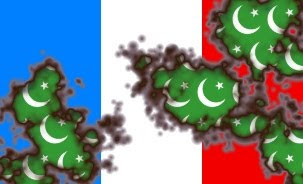
Salah Abdeslam is the only surviving member of the leadership group of Islamic terrorists who carried out the deadly attacks in Paris in November of 2015, including the unbelievably bloody slaughter at the Bataclan café. Mr. Abdeslam’s trial in Paris has been underway for months.
I reported previously on the opening day of the trial last September, and then in November on Mr. Abdeslam’s testimony on the stand. The trial is expected to continue until May.
Many thanks to Gary Fouse for translating this article from Paris Match:
At the November 13 trial, the “no comment”s from Salah Abdeslam
March 15, 2022
The trial for the deadly attacks of 13 November 2015 continues. The principal defendant, Salah Abdeslam, gave few answers Tuesday on his role in the preparations of jihadist attacks.
“Exactly, on that I will not say.” At the trial of the deadly November 13, 2015 attacks in France, the principal defendant, Salah Abdeslam, gave few responses Tuesday on his role in the preparations for the jihadist attacks, often contenting himself with a “no comment”. Salah Abdeslam, the only surviving member of the commandos, had explained himself at length during his first questioning in the case on February 9, after remaining silent during the five years of the investigation. The jihadist attacks produced 130 deaths in Paris and at Saint-Denis, in the suburbs.
The 32-year-old Frenchman had hinted several times that he had taken, “a step back” and decided not to activate his explosive belt on the evening of the attacks. On Tuesday this second interrogation concerns his role in the logistics put into place by the jihadist cell in August 2015. Salah Abdeslam is in particular suspected of making two trips in France to look for explosives. He is also accused of “the recovering of terrorists” returning from Syria, employing five convoys in Europe, using vehicles rented under his true identity, recalls the president of the criminal court in Paris, Jean-Louis Peries.
“Me, I am not giving any name. I don’t flip.”
The principal defendant does not deny obtaining vehicles. “On the other hand, “he admits to having brought back “some” members of the commandos, but not all. The three Frenchmen who would make up the “trio” who entered in the Bataclan concert hall, for example, were not from his group, he claimed, dressed in a shirt with small checks, gelled hair, and a black mask on his face. Expressing himself with ease, at times bordering on insolence, Salah Abdeslam admitted two round trips to look for “brothers in Islam”. “They had been living in the war zone,” he explained.
A little like “the war in Ukraine today,” those who go “look for people at the border,” leave “to do humanitarian work,” or “fight”, he says. If he wasn’t the driver of the first of five trips attributed to him, to when did he loan the vehicle? His childhood friend and co-defendant? “Me, I don’t give names. I don’t flip,” retorts Salah Abdeslam.
The magistrate insists, and tries other names. “I think you have not understood me well, Mister President,” the accused mocks. “Tell the truth; it will go faster,” continues Jean-Louis Peries. “You don’t want to say who asked you to rent the vehicle?” “Exactly,” Salah Abdeslam cuts him off. The tone rises when the magistrate asks him what he knew about the organization. “I have the impression that you are a little sensitive,” quips Salah Abdeslam.
“You have screwed up my life”
After threatening him with contempt of court, the president moves on to the second trip, one of the only two that Salah Abdeslam has admitted making. But to specific questions, he responds with silence or obstinate “no comment”s. He criticizes the “sloppy work” of the case. It is based on “sophisticated” investigations, protest the president. “We won’t say that it was great either,” retorts Salah Abdeslam. “I was checked during the second trip; I rented the vehicles under my name.” “Surreal,” the civil parties say indignantly.
Confronted with the perseverance of the court, Salah Abdeslam repeats that he knew nothing of the “mission” of the men he went in search for. “If you had known that these persons were going to participate directly or indirectly in the attacks, would you have gone to look for them?” asks a (judge), Xaviere Simeoni. “Frankly, it’s a good question,” says the defendant. He takes his time and adds: “In the spirit I was in at the time, party animal, engaged to be married, I think I would not have left to look for them,” even if “without doubt, they had good reasons.”
But “today, you have screwed up my life, France, its government. The way which you have treated me for six years, it leaves marks”. The judge cuts him off. Those are not the “answers the civil parties expect.” One of his lawyers. Attorney Olivia Ronen, is surprised at this comment and says that the trial’s purpose is “to bring out the truth.”
